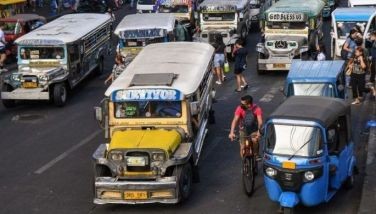205 convicts face execution
February 8, 2004 | 12:00am
About 205 convicts on death row in the Philippines could face execution in the next 18 months, an anti-crime group declared Saturday.
The death sentences, according to the report of the anti-crime Citizen’s Drug Watch Foundation, have all been upheld by the Supreme Court, covering 143 convicted rapists, 21 murderers, 18 convicted for robbery with homicide, 15 for kidnapping with ransom and eight for drug trafficking.
Fourteen of the convicts are set to be executed by lethal injection this month unless the presidential palace intervenes, said former senator Ernesto Herrera, DrugWatch chairman, in a statement.
President Arroyo declared last December that she was ending a four-year-old moratorium on death penalty in order to curtail violence and crime in the country including the rampant kidnapping for ransom that had targetted rich Chinese community.
However, the first execution scheduled under Mrs. Arroyo was put off on Jan. 28 when the Supreme Court granted a reprieve to two convicted kidnappers to study a motion on whether their case should be reopened.
The reprieve for the two convicted kidnappers however does not cover others who are scheduled for execution.
Human rights groups and the dominant Roman Catholic Church condemned the return of the death penalty and European governments have urged Mrs. Arroyo to change her stand but the president has said she will not block executions.
Meanwhile, Herrera welcomed the Supreme Court decision upholding the conviction of six scions of prominent families in Cebu for the 1997 kidnapping, illegal detention, rape and killing of college queen Marijoy Chiong and her sister Jacqueline.
"The Supreme Court decision has demolished the argument that the death penalty is anti-poor and pro-rich. The law is, in fact, blind in the matter of the social or economic standing of the accused," Herrera, one of the principal authors of the 1994 Death Penalty Law, said. — AFP
The death sentences, according to the report of the anti-crime Citizen’s Drug Watch Foundation, have all been upheld by the Supreme Court, covering 143 convicted rapists, 21 murderers, 18 convicted for robbery with homicide, 15 for kidnapping with ransom and eight for drug trafficking.
Fourteen of the convicts are set to be executed by lethal injection this month unless the presidential palace intervenes, said former senator Ernesto Herrera, DrugWatch chairman, in a statement.
President Arroyo declared last December that she was ending a four-year-old moratorium on death penalty in order to curtail violence and crime in the country including the rampant kidnapping for ransom that had targetted rich Chinese community.
However, the first execution scheduled under Mrs. Arroyo was put off on Jan. 28 when the Supreme Court granted a reprieve to two convicted kidnappers to study a motion on whether their case should be reopened.
The reprieve for the two convicted kidnappers however does not cover others who are scheduled for execution.
Human rights groups and the dominant Roman Catholic Church condemned the return of the death penalty and European governments have urged Mrs. Arroyo to change her stand but the president has said she will not block executions.
Meanwhile, Herrera welcomed the Supreme Court decision upholding the conviction of six scions of prominent families in Cebu for the 1997 kidnapping, illegal detention, rape and killing of college queen Marijoy Chiong and her sister Jacqueline.
"The Supreme Court decision has demolished the argument that the death penalty is anti-poor and pro-rich. The law is, in fact, blind in the matter of the social or economic standing of the accused," Herrera, one of the principal authors of the 1994 Death Penalty Law, said. — AFP
BrandSpace Articles
<
>
- Latest
- Trending
Trending
Latest
Trending
Latest
Recommended































